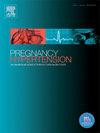验证尿液刚果红子痫前期检测点设备。
IF 2.5
4区 医学
Q2 OBSTETRICS & GYNECOLOGY
Pregnancy Hypertension-An International Journal of Womens Cardiovascular Health
Pub Date : 2024-11-02
DOI:10.1016/j.preghy.2024.101167
引用次数: 0
摘要
研究目的评估用于评估先兆子痫风险的刚果红尿液商用装置:前瞻性非干预研究:对临床怀疑有子痫前期的妇女进行研究。结果测量:结果:异常扩散模式分为阳性和阴性,与随后确认子痫前期的关系(检出率、假阳性率和预测值),以及在固定时间内确诊的概率(排除和排除):有 600 名妇女参加了这项研究,并获得了 538 名妇女的随访资料,其中 95 人在分娩时患有子痫前期,443 人没有。登记时的检出率为 18%,假阳性率为 3.2%;阳性预测值(阳性结果与子痫前期相关的概率)为 55%,阴性预测值(阴性结果与子痫前期无关的概率)为 85%。检测结果呈阳性的产妇中,有 35% 在 28 天内排除了子痫前期,98% 在 7 天内排除了子痫前期。入院后再次检测的结果与初次样本相似:结论:尽管已发表的研究在观察到的检出率方面存在差异,但该检测具有筛查潜力。使用该检测在 7 天内排除子痫前期可为管理带来显著优势,尤其是在分流患者和选择可在外围中心管理的患者方面。本文章由计算机程序翻译,如有差异,请以英文原文为准。
Validation of urinary Congo Red preeclampsia detection point-of-care devise
Objectives
To evaluate a commercial a Congo Red urine devise for assessing preeclampsia risk.
Study design: Prospective non-intervention study among women presenting with clinical suspicion of preeclampsia. The devise was used at the time of enrolment and, depending on gestation, on 1–3 later occasions.
Outcome measures: Abnormal diffusion patterns classified as positive or negative, in relation to subsequent confirmation of preeclampsia (detection and false-positive rates, and predictive value) and the probability of diagnosis within a fixed time period (rule-in and rule-out).
Results
600 women were enrolled in the study and follow-up information was available on 538, of whom 95 had preeclampsia at delivery and 443 did not. At enrolment the detection rate was 18 % and the false-positive rate 3.2 %; positive predictive value – probability of positive result being associated with preeclampsia – was 55 % and negative predictive value – probability of negative result not being preeclampsia – was 85 %. A positive test ruled-in delivery with preeclampsia within 28 days among 35 % and ruled-out preeclampsia with 7 days among 98 %. Repeat testing after enrolment yielded similar results to the initial sample.
Conclusion
The test has screening potential although published studies differ in the observed detection rate. Using the test to rule-out preeclampsia within 7 days can provide a significant management advantage especially for triaging patients and selecting those who can be managed at the peripheral centres.
求助全文
通过发布文献求助,成功后即可免费获取论文全文。
去求助
来源期刊

Pregnancy Hypertension-An International Journal of Womens Cardiovascular Health
OBSTETRICS & GYNECOLOGYPERIPHERAL VASCULAR-PERIPHERAL VASCULAR DISEASE
CiteScore
4.90
自引率
0.00%
发文量
127
期刊介绍:
Pregnancy Hypertension: An International Journal of Women''s Cardiovascular Health aims to stimulate research in the field of hypertension in pregnancy, disseminate the useful results of such research, and advance education in the field.
We publish articles pertaining to human and animal blood pressure during gestation, hypertension during gestation including physiology of circulatory control, pathophysiology, methodology, therapy or any other material relevant to the relationship between elevated blood pressure and pregnancy. The subtitle reflects the wider aspects of studying hypertension in pregnancy thus we also publish articles on in utero programming, nutrition, long term effects of hypertension in pregnancy on cardiovascular health and other research that helps our understanding of the etiology or consequences of hypertension in pregnancy. Case reports are not published unless of exceptional/outstanding importance to the field.
 求助内容:
求助内容: 应助结果提醒方式:
应助结果提醒方式:


